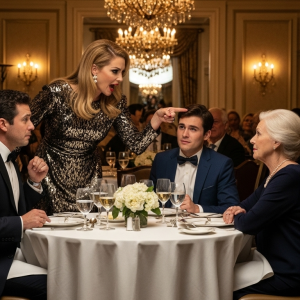The city exhaled the day’s heat as evening settled, bathing the streets in the soft, orange glow of the streetlights. A gray police SUV, its distinctive stripe cutting through the dusk, moved at a crawl. Inside, Officer Kowalev stifled a yawn, his gaze sweeping over the mundane theater of urban life: a woman walking her dog, a group of teens laughing by a shop, a man hurrying home from work.
“Quiet tonight,” he murmured, the words rumbling with the fatigue of a long shift.
Beside him, Officer Melnikova offered a faint smile, her eyes sharp and alert despite the hour. “I wish they were all like this,” she replied. “But this kind of calm… it’s usually just the eye of the storm.”
She couldn’t have known how right she was. Before the words had fully left her lips, a small figure burst from the entrance of a nearby apartment building. It was a blur of motion—blonde hair, bunny-print pajamas, and the pale flash of bare feet slapping against the cool pavement. Panic radiated from the child like heat from asphalt.
She ran directly toward them, a tiny missile of terror. Kowalev slammed on the brakes, the SUV lurching to a halt just inches from her. In a second, both officers were out of the car, their practiced calm shattered.
Melnikova was the first to reach her, crouching to meet the girl’s wide, terrified eyes. “Hey, are you okay? What happened?”
The little girl’s chest was heaving, her breath coming in ragged sobs. “You… you’re the police, right?”
“Yes, sweetie,” Melnikova said, her voice a gentle anchor in the girl’s whirlwind of fear. “We’re the police. What’s your name?”
“Lily,” she gasped. “There’s a man. He’s under my bed.”
Kowalev’s brow furrowed, his default expression of veteran skepticism clicking into place. “Lily, where are your parents?”
“Mom’s in the bathroom. I screamed, but she told me to stop making things up,” Lily cried, tears finally breaking free and tracing clean paths through the grime on her cheeks. “She didn’t believe me.”
The officers exchanged a look. It had all the hallmarks of a child’s nightmare, a classic case of an overactive imagination. But the terror in Lily’s eyes was primal and deeply convincing. It wasn’t the theatrical fear of a child who wanted attention; it was the raw panic of someone who had looked into the face of a real monster.
“Tell us what he looked like,” Melnikova prompted gently, ignoring Kowalev’s impatient sigh.
“He was all in black,” Lily whispered, her small hands clenching into fists. “And he had a mask. Like a ninja. I woke up because I heard something, and I saw him crawling under my bed. He didn’t know I was awake… he thought I was asleep.”
“And you ran?” Kowalev asked, his tone softening slightly.
“Yes. I held my breath and slid out of bed. I hid in the closet and watched through the crack. Then I saw your car from my window and I just… ran.”
Melnikova nodded, her decision made. “Okay, Lily. We’re going to go check it out. Better to be sure.” She gave Kowalev a look that dared him to object. He just shook his head and followed them into the building.
The apartment was on the third floor. Lily’s mother, Anna, opened the door, a towel wrapped around her hair, her face a mixture of fright and deep embarrassment.
“Oh, officers, I am so sorry,” she stammered, wringing her hands. “Lily has such a vivid imagination. Lately, she keeps saying something is hiding in the corner. I thought she was just scared of the dark again.”
The officers moved past her into Lily’s room. It was a perfectly normal child’s bedroom, with a soft pink comforter and stuffed animals arranged on a shelf. Kowalev and Melnikova swept their flashlight beams across the floor, the stark white light cutting through the shadows.
They checked the closet. They looked behind the curtains. Finally, Kowalev dropped to one knee and aimed his light under the bed. The beam illuminated nothing but a few lost socks and a thick layer of dust. The space was undeniably empty.
“Maybe he ran away,” Lily whispered from the doorway, her small body trembling. “But I really saw him. Honest!”
Kowalev stood up, a paternal, slightly amused smile on his face. “Looks like your monster picked the wrong house, kiddo. He’s long gone.” He was about to suggest a glass of warm milk, but Melnikova silenced him with a sharp gesture.
She knelt in front of Lily again, her expression serious. “Lily, I believe you saw something. Your look… it’s too confident. You can’t fake that kind of fear.” She turned to the mother. “Do you have surveillance cameras in the building?”
Anna blinked, confused. “Yes, in the lobby and on the street corners. But officers, there’s nothing here…”
“Humor me,” Melnikova said, her voice leaving no room for argument. “Let’s check the footage.”
Down in the building’s small security office, the mundane evening transformed into a thriller. Melnikova expertly rewound the street camera footage, her eyes scanning the grainy, black-and-white images.
“There,” Kowalev said, suddenly leaning forward. “Fifteen minutes before Lily ran out.”
On the screen, they saw a robbery in progress in the adjacent building. Two figures in black burst from the entrance, clutching heavy bags. On another camera angle, they saw the chase begin as a patrol car—their own—rounded the corner.
The two criminals split up. One ran down the street. The other, seeing their approaching SUV, made a split-second decision. He darted into the alley between the buildings. The camera angle was perfect. They watched in stunned silence as the figure, agile as a spider, scrambled up a drainpipe. He reached the third floor and, finding a window slightly ajar, slipped inside without a sound.
It was Lily’s window.
“My God,” Anna whispered, her hand flying to her mouth, her face draining of all color.
“This was literally one minute before she ran to us,” Melnikova said, her voice grim.
They switched to the camera on the opposite side of the building. Seconds after the man had entered, the footage showed him leaping from a different window—the kitchen window—and disappearing into the dark courtyard below. He had used the apartment as a shortcut to escape, never imagining the little girl in the bed was awake. He had crawled under her bed to hide while he waited for the police car to pass.
The room was silent, the weight of what they had just seen pressing down on them. The monster under the bed was real. The ninja in the dark was real. Lily hadn’t been dreaming. She had been a witness.
Kowalev stared at the screen, his earlier skepticism replaced by a cold, professional fury. He looked over at Lily, who was watching them with wide, knowing eyes. He had almost dismissed her. He had almost told her to go back to bed.
The rest of the night was a blur of police procedure. The criminal’s accomplice was apprehended within the hour, and under interrogation, he quickly gave up his partner. The second man was arrested the next day, found hiding in a relative’s house across town. The stolen goods were recovered.
The man confessed he had seen the open window as his only escape. He had slipped inside, planning to hide for just a minute. He saw the child in the bed and assumed she was fast asleep. Crawling underneath was a desperate, instinctual move to remain unseen. He never planned for her to wake up.
The following evening, Melnikova and Kowalev returned to the apartment. This time, there was no emergency. Melnikova carried a small, gift-wrapped box.
Anna opened the door, her eyes still holding a shadow of the previous night’s horror, but also a new, fierce gratitude. “Officers, I… I don’t know how to thank you.”
“You don’t have to,” Melnikova said, smiling. “We just came to see our best witness.”
Lily was sitting on the sofa, looking much smaller without the adrenaline of fear. Melnikova sat down beside her and handed her the box. Inside was a teddy bear dressed in a tiny police uniform.
“This is for you,” Melnikova said softly. “For being so brave. You did everything right, Lily. You were smart, you were fast, and you helped us catch a very bad man.”
Lily hugged the bear tightly, a real, genuine smile finally returning to her face.
Anna watched them, tears welling in her eyes. “I didn’t believe her,” she said quietly to Kowalev. “I was so tired, and I just… I didn’t listen.”
“Most parents wouldn’t have,” Kowalev admitted, his voice full of a newfound humility. “It’s easy to dismiss things we can’t see. Your daughter reminded us that sometimes, you have to trust what you hear, even if it sounds like a fairytale.”
As they left, Melnikova glanced back at the third-floor window. The world was full of shadows and dark corners. But tonight, thanks to one very brave little girl in bunny pajamas, there was one less monster hiding in them.
In the weeks that followed, a fragile sense of normalcy returned to the third-floor apartment, but it was a different kind of normal. It was a life punctuated by new rituals, born from the terror of a single night. The teddy bear in the police uniform, now named “Sarge,” became Lily’s constant, silent guardian. He stood watch on her pillow at night and sat beside her at the breakfast table in the morning.
Lily rarely spoke of the “ninja,” but the man under the bed had not truly left. He had simply moved, transforming from a physical presence into a resident shadow in the corners of her mind. Every night before bed, the game was the same. Anna would stand in the doorway while Lily, armed with a small flashlight, would drop to her knees and methodically sweep the beam across the dusty space beneath her bed.
“All clear, Mommy,” she would announce, her small voice imbued with a seriousness that broke Anna’s heart. Then she would check the closet, her stuffed animals rearranged to ensure no one could hide behind them. Only then could she sleep.
For Anna, guilt was a constant companion. The memory of her own dismissal—“Stop making things up, Lily”\—played on a loop in her mind. What if Lily hadn’t been brave enough to run? What if the man hadn’t been a panicked amateur, but something worse? The “what ifs” were a special kind of torment. She had installed a new deadbolt, window locks, and a motion-sensitive camera in the hallway. She had turned their home into a fortress, but she knew the deepest fear came from the enemy you had already let inside: the memory itself.
For Officers Kowalev and Melnikova, the incident had subtly reshaped their partnership. A new current of respect flowed between them. Kowalev, the jaded veteran, had been humbled. He’d seen firsthand how a child’s “fairytale” could be a headline in disguise. Melnikova’s intuition, once a source of gentle friction between them, was now an acknowledged asset. She found herself unable to shake the image of Lily’s small, bare feet on the cold pavement, a tiny beacon of truth in a disbelieving world.
The case of the clumsy robber, Petrov, was officially closed. He was a low-level thief with a short record, and his accomplice’s testimony had sealed his fate. It was a clean, simple resolution. An open-and-shut case that should have faded from memory. But for Melnikova, one thread remained stubbornly, inexplicably loose.
A month later, a new pattern of crime began to emerge across the city. It was a series of high-end burglaries, executed with surgical precision. The targets were wealthy homeowners, the stolen items a strange mix of untraceable bearer bonds, rare art, and specific corporate data from personal laptops. The thief, or thieves, moved like ghosts, disabling sophisticated alarm systems and leaving behind no forensic evidence. The department was stumped, and pressure from the city’s elite was mounting.
One rainy Tuesday night, Kowalev and Melnikova were the first to respond to another such burglary in a wealthy district across town. They walked through the silent, pristine apartment, the air still and heavy. The owner, a tech executive, pointed out the disabled alarm panel and the clean, empty space on the wall where a valuable painting had been.
“They were professionals,” Kowalev muttered, surveying the scene. “In and out in under ten minutes. No fuss, no mess.”
Melnikova, however, felt a strange sense of déjá vu. Something about the precision, the quiet confidence of the crime, felt dissonant with the memory of the panicked, clumsy robber they had caught a month ago. She remembered Petrov, a man who had blundered his way into a child’s bedroom and gotten caught because his partner was a fool. He didn’t fit this elegant, sophisticated profile.
That night, unable to sleep, she went to the station and pulled the file for Petrov’s arrest. She read through the reports, the inventory of stolen goods—a few laptops, some cash, a bag of assorted electronics. It was a standard smash-and-grab. It didn’t connect to the new string of professional heists at all. So why couldn’t she shake the feeling that it did?
Her finger traced the address of the initial robbery, the building next to Anna and Lily’s. It was all so chaotic, so amateurish. Yet the man had scaled a drainpipe to the third floor with the agility of a trained professional. The pieces didn’t fit. She closed the file, the loose thread still tugging at the edge of her thoughts.
A week later, driven by a hunch she couldn’t articulate, Melnikova bought a small bag of candy and drove to Anna and Lily’s apartment. She told herself it was just a friendly check-in, a way to ensure the little girl was truly okay.
Anna welcomed her with a grateful smile, and the three of them sat in the kitchen, sharing tea and cookies. Lily was chattering happily, showing Melnikova how “Sarge” could now perform a perfect salute. She seemed better, lighter. But then Melnikova’s eyes were drawn to the collection of children’s drawings taped to the refrigerator.
They were typical five-year-old art: a lopsided house, a smiling sun, a portrait of her and her mother holding hands. But among them were several darker pictures. They depicted a small figure in a pink bed and a large, blocky shadow lurking in the corner or underneath. The Shadow Man. The Ninja.
In every single drawing of the man, Melnikova noticed a strange, recurring detail. On the figure’s left hand, Lily had drawn a small, eight-legged shape with a silver crayon.
Melnikova felt a prickle on the back of her neck. She knelt down to Lily’s eye level. “Lily, I love your drawings. Can you tell me about this one?” she asked, pointing to the shadow figure.
“That’s the ninja,” Lily said matter-of-factly. “He was hiding from the flashing lights.”
“And what’s this on his hand?” Melnikova asked, her voice casual. “It’s very shiny.”
Lily leaned in conspiratorially. “He had a shiny spider on his glove, Auntie Lena,” she whispered, as if sharing a great secret. “It sparkled when your car’s light came through the window. It was pretty.”
The word hung in the air. A shiny spider. It was a detail that had never come up in the original interview. In the chaos and fear of that night, who would have asked? And what adult would have believed that a terrified child had noticed, and remembered, such a small, fantastic detail? But Lily wasn’t describing a monster from a dream. She was describing an accessory.
Melnikova felt a sudden, chilling certainty. The man under the bed was not Petrov’s known accomplice. He was someone else entirely.
Back at the station, Melnikova’s urgency was contagious. Kowalev, remembering the lesson he had learned, didn’t question her. He sat with her for hours, diving into the department’s arcane criminal databases.
“Search for aliases, tattoos, or known symbols involving spiders,” she urged. “Anything.”
They sifted through decades of old files, the screen a blur of mugshots and rap sheets. Just as Kowalev was about to give up, an archived file from over a decade ago flickered onto the screen. It was a small, now-defunct crew of thieves known as “The Weavers.” They had specialized in high-end art and corporate espionage, known for their clean, ghost-like heists. They were considered long disbanded after their leader was imprisoned.
And then they saw it. In the margins of an old informant’s report, a handwritten note: “Leader, a man known only as ‘Arachne,’ wears a custom silver ring or emblem. A black widow spider.”
The pieces of the puzzle began to slam into place with brutal clarity.
“Petrov wasn’t the target,” Melnikova said, her voice low with dawning horror. “He was a distraction. A mule.”
Their new theory was terrifying. The Weavers were back in business. They had hired a low-level crew, Petrov and his partner, to create a noisy, chaotic robbery in one building as a diversion. While police resources were focused on that, the real Weaver—the man with the spider emblem—had infiltrated the second building, the one where Anna and Lily lived, to steal something far more valuable.
But Petrov had panicked. He had run early, drawing the patrol car—their car—to the scene prematurely. The Weaver, his own mission interrupted, had been forced to flee. Scrambling up the drainpipe and hiding under Lily’s bed wasn’t the act of a common thief escaping the police; it was the act of a master criminal trying to evade an unexpected complication.
This meant that a dangerous, meticulous, and professional thief—a man who led a ghost-like crew—was still at large.
And he knew that a five-year-old girl had seen his calling card.
The revelation changed everything. Lily was no longer the past witness to a solved case. She was the only living link to a high-level criminal organization, a loose end that a man like “Arachne” would not leave untangled forever.
The threat was no longer a memory; it was active, intelligent, and lurking somewhere in the city.
Melnikova and Kowalev immediately briefed their captain. The case was elevated, a quiet but intense protective detail was placed on Anna and Lily’s building. Unmarked cars were stationed at either end of the street, manned by plainclothes officers 24/7. Anna was told it was a “precautionary measure due to recent crime in the area.” They couldn’t tell her the truth without causing a level of panic that might, itself, be dangerous.
That night, Anna went through the familiar bedtime ritual. She stood by the door as Lily swept the flashlight beam under the bed.
“All clear, Mommy,” Lily announced, climbing into bed and hugging Sarge the bear. She looked safe. She looked content. The fortress Anna had built around her life seemed to be holding.
But outside, across the street, a man sat in a nondescript sedan, the engine cold. He watched the light in the third-floor window, a patient, disciplined stillness in his posture. He had been watching the building for weeks, learning their routines, noting the new police presence. He knew he couldn’t get back inside. Not yet.
He idly reached into his pocket and pulled out a small, intricately crafted silver pin. It was a black widow spider, its legs curled delicately. He polished it with his thumb, its surface glinting in the faint light from the dashboard.
The monster was no longer under the bed.
He was across the street, watching, and waiting.




